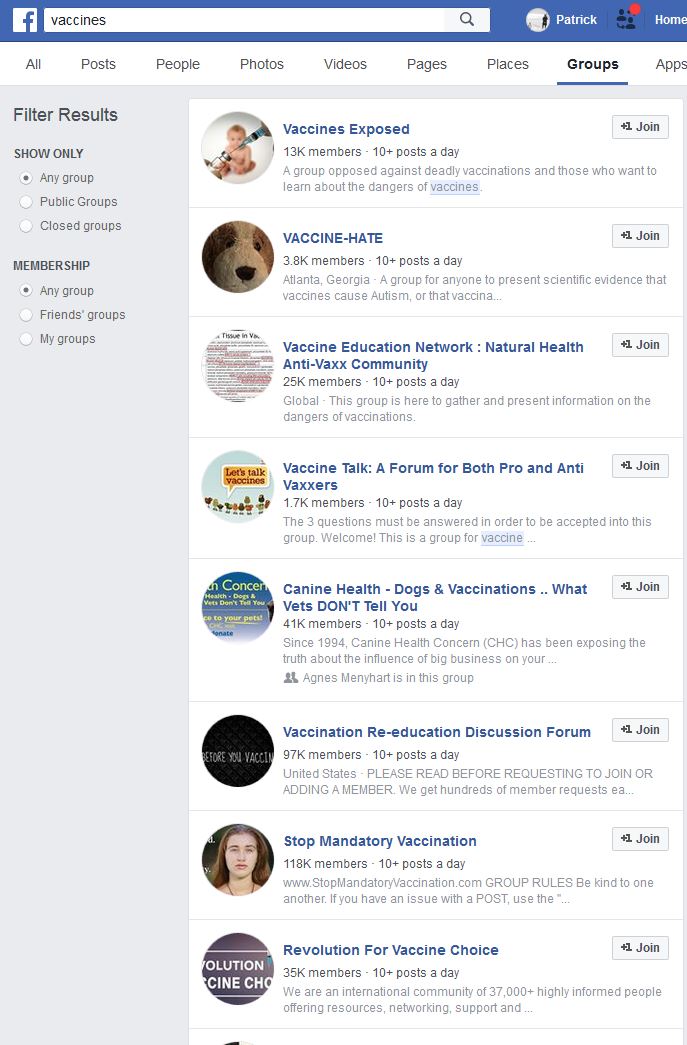Across North America, the flu season has been the worst in years.

Over 50 children have died of influenza in the U.S. so far, and five in Canada.
Compounding the problem is that this year’s flu vaccine isn’t as a great a match for H3N2, 2017-18’s nasty flu strain, as would be ideal. (It takes so long to make the world’s supply of flu vaccine that decisions about what strain to target the vaccine have to be made many months in advance.)
The dangers posed by influenza — to the young and elderly, but also sometimes to fit and healthy young adults — aren’t new. The flu epidemic of 1918 killed more people than the First World War, after all.
What is new, and making public health officials nervous, is the intersection of anti-vaxxers, fake news, and the role of platforms like Facebook in spreading vaccine-hostile fake news.
Last week, we looked at how a fake anti-vax story on Your News Wire (CDC Doctor: ‘Disastrous’ Flu Shot Is Causing Deadly Flu Outbreak) got hundreds of thousands of Facebook engagements in mid-January.
But for the 55,000-odd people who have liked or followed Your News Wire’s Facebook page, the diet of anti-vax fake news is relentless:
- What is Nipah virus? What to know about the disease as India faces outbreak
- Head-Smashed-In Buffalo Jump heritage site enjoys boost after shout out on ‘The Pitt’
- Pizza Pops contaminated with E. coli tied to 7 hospitalizations, data shows
- Pizza Pops E. coli recall grows as roughly a dozen products now hit
- Feb. 9: Dallas Man Has Fingers And Toes Removed After Receiving Flu Shot (He did, but due to the flu, not the shot)
- Feb. 7: Bill Gates’ Former Doctor Says Billionaire ‘Refused To Vaccinate His Children’ (This is debunked, and in any case Gates has donated a vast fortune to vaccination)
- Jan. 27: Trump Warns Flu Shots Are The Greatest ‘Scam’ In Medical History (There’s no evidence he said this)
In any case, you get the idea.
At InfoWars, Alex Jones beats a similar drum, telling his readers on Jan. 29 that ” … The mainstream press, with non-stop pro-vaccination propaganda, is colluding with the medical establishment and governments to silence critics.”

Get weekly health news
All of this makes people who pay attention to infectious disease uneasy.
“Vaccines are one of the most important scientific inventions of all time,” vaccination experts Heidi Larson and Peter Piot wrote in January. “Yet these vital public-health tools are under threat from growing public mistrust in immunization and the rise of so-called ‘fake news’ drowning out expert voices.”
Why does anti-vax messaging spread on Facebook? Well, when you look at how search works, it isn’t surprising.
Here’s how Facebook responded to a neutral search for “vaccination” just now in recommended pages:
And in recommended groups:
Try it yourself.
So what is the appeal of an anti-vax niche for sites like Your News Wire?
Well, as we saw, the odd one goes viral (in the electronic sense, not the medical sense) and there’s money to be made in that. (The fake CDC flu story was #12 for engagements on all of Facebook for the third week of January, which should cause some sober reflection about how the changes to Facebook’s algorithm are working out so far.)
But another thing we need to pay attention to, as Think Progress pointed out, is that Your News Wire ” … points to Russian propaganda outlets, including RT, as both a model and a source. Researchers in the European Union identified the site as a ‘proxy’ for Russian disinformation.”
This raises a second possibility.
People who oppose vaccination are more likely to believe other conspiracy theories, an Australian study found. Anti-vaxxers also more often held that ” … Princess Diana was murdered; that the U.S. government knew about the 9/11 attacks in advance and allowed them to happen; that a shadowy group of elites is plotting to create a new world order; and that there was an elaborate plot to assassinate President John F. Kennedy that has been covered up.”
So if your niche is Antivax Fake News Central, you’ve gathered an audience of tens of thousands of people who are predisposed to believe conspiracy theories. Something to keep an eye on.












Comments